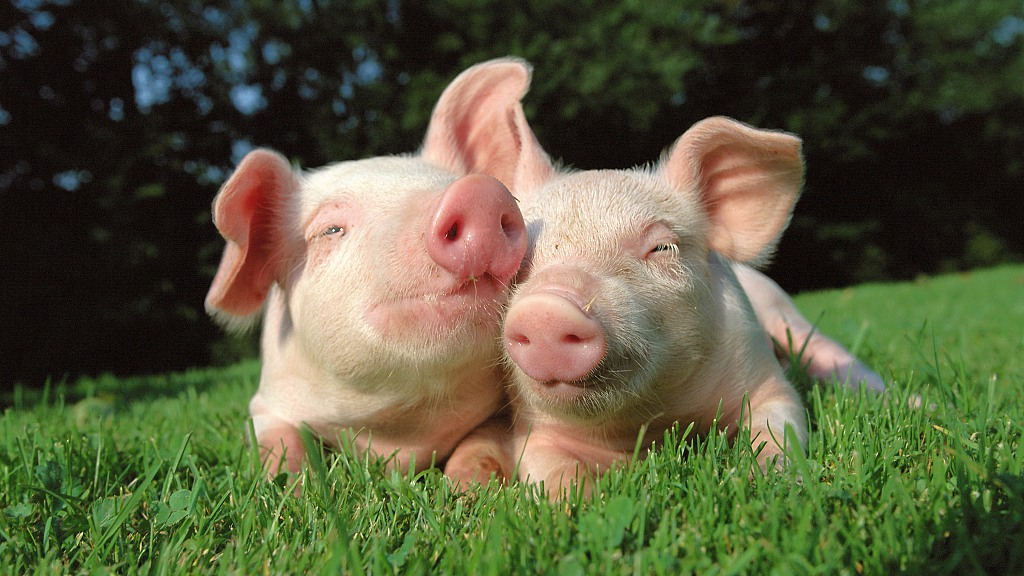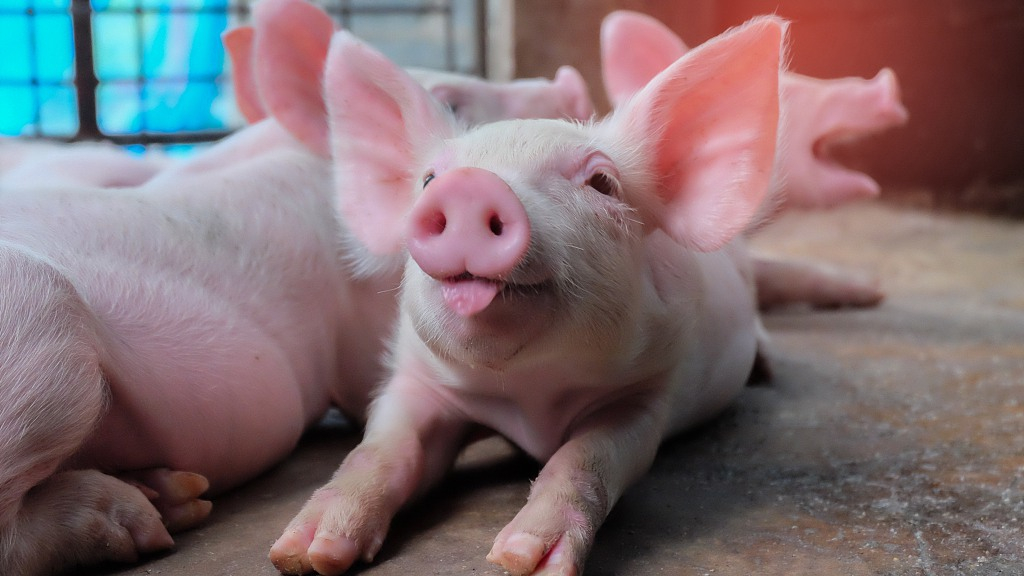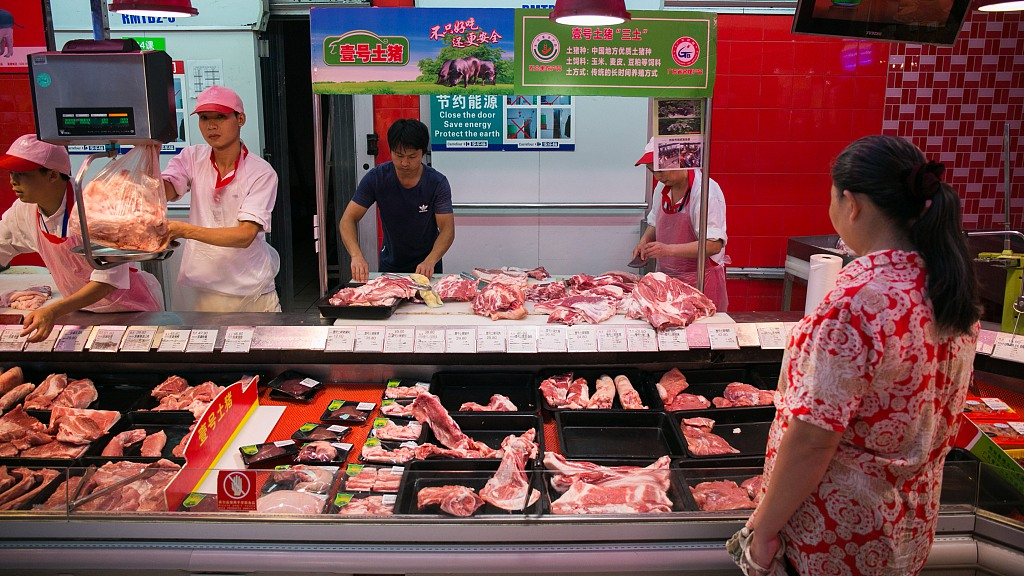
Biz Analysis
17:25, 07-Jun-2019
Is China experiencing a meat crisis?
Updated
19:35, 07-Jun-2019
Li Jianhua
02:14

China continues struggling with meat imports as the unprecedented African swine fever sweeps across the country. The intense China-U.S. trade war might make the situation worse, as high tariffs are imposed on U.S. farm produce. Currently, Chinese meat importers are switching their attention to other options to fill the gap for the nation's meat demands.
Research shows Chinese people consume an average of 55 million tons of pork on a yearly basis, according to Research on China Pig Breeding Market and Its Development (2017-2023).
African swine fever
African swine fever has swept across China since last year, wreaking havoc in the world's second largest economy's pork industry, which is worth some 128 billion U.S. dollars.
Chinese authorities in April went on record as saying that pork prices will continue to rise in the second quarter of this year.

A smiling pig. /VCG Photo
A smiling pig. /VCG Photo
"A rapid rise in pork prices is likely to appear in the second half of the year with the further decline of pig supply and the rising demand during holidays," said Tang Ke, an official with Chinese Ministry of Agriculture and Rural Affairs (MARA).
Average wholesale prices of pork stood at nearly three U.S. dollars per kilo in March, up 6.3 percent on a monthly basis, ending a declining streak since the outbreak of African swine fever last August, according to the ministry.
Growth in pork prices is expected to surpass 70 percent in the second half of 2019 compared with that of last year -- based on experts' primary estimates.
To offset the negative effects on China's pork market, over 74 million pigs across China were slaughtered for meat from January to April, according to MARA. The figure – compared with the same period of last year –dropped by about eight percent, but higher than that in 2017 by over nine percent.
Nevertheless, observers say there is not enough pork in "the whole world combined" to answer the massive demands for China's pork market – owing largely to the African swine fever.
"Demand for pigs is usually higher in the summer, but the lack of supply is creating an imbalance. It's reflected in pork and food prices and also seen in a CPI growth. There will be a great impact on the world market," said Liu Chunsheng, associate professor with Central University of Finance and Economics.

A dish of sliced pork. /VCG Photo
A dish of sliced pork. /VCG Photo
China reportedly detected the virus in pig farms in August last year, and the disease soon swept across most parts of the country, as the virus is highly contagious among pigs. The disease can also be passed on to pigs that consume contaminated feed, equipment, or water.
Since the outbreak of the disease, Chinese pig farmers have been ordered to kill and bury infected animals. But some pig farmers killed their pigs – including those that have been found sick – and stocked up the pork to minimize their losses, according to some business insiders.
The virus, though quite contagious among pigs, does not affect humans if the meat is well cooked. Regardless, many pork consumers are still quite skeptical. "What if the virus mutates and turns out to be harmful to human health?" said one consumer to CGTN.
The disease is also found in China's neighboring countries, including Mongolia, Vietnam and the DPRK. But the sources of contamination remain unknown as of yet, and vaccines have not been found.
Trade war reduces China's pork supplies?
As the China-U.S. trade war tenses up, pork imports from the U.S. have borne the brunt of tariff hikes. Meanwhile, the tariffs on American soybean exports – whose by-products are the major feed for hogs and breeding sows in China – have deteriorated the situation, according to analysts.

A woman picks pork products in a supermarket. /VCG Photo
A woman picks pork products in a supermarket. /VCG Photo
Figures show the U.S. is ranked as the fifth largest pork exporter to China in 2018, according to research by IQC Insights.
China's pork imports from the U.S. accounted for 6.8 percent of the country's total pork imports, according to Chinese customs, and the figure is decreasing in the first four months of 2019.
"We mainly import pork and beef from the United States, and pork makes up a bigger proportion. According to Customs, [Guangdong] imported 86,000 tons of pork and 7,000 tons of beef from the U.S. last year," said Qi Yilong, president of Guangdong (China) Imported Food Association. "American pork used to take a large share in the Chinese market, but the trade war has brought it down. Many other countries may replace it soon."
To minimize the impacts of the trade war – and notably the African swine fever – on China's pork market, Chinese global food importers are switching to European countries for replacements – chief among them are Germany, Spain, Canada, Brazil and Argentina.
"Since last year, our imports have increased by a fold. The domestic demand is huge. As for seafood, we are now importing from Russia and South America. For beef, we import from Argentina, and as with chicken, it's from Brazil and Argentina. And for pork, we import from Europe and Canada," said Zheng Weisheng, chairman of Guangzhou Wakan Group, a global food importer based in south China.
Pork imports from countries such as Spain, Canada, and the UK saw an increase of over 10 percent in the first four months of 2019, according to Chinese customs.

SITEMAP
Copyright © 2018 CGTN. Beijing ICP prepared NO.16065310-3
Copyright © 2018 CGTN. Beijing ICP prepared NO.16065310-3